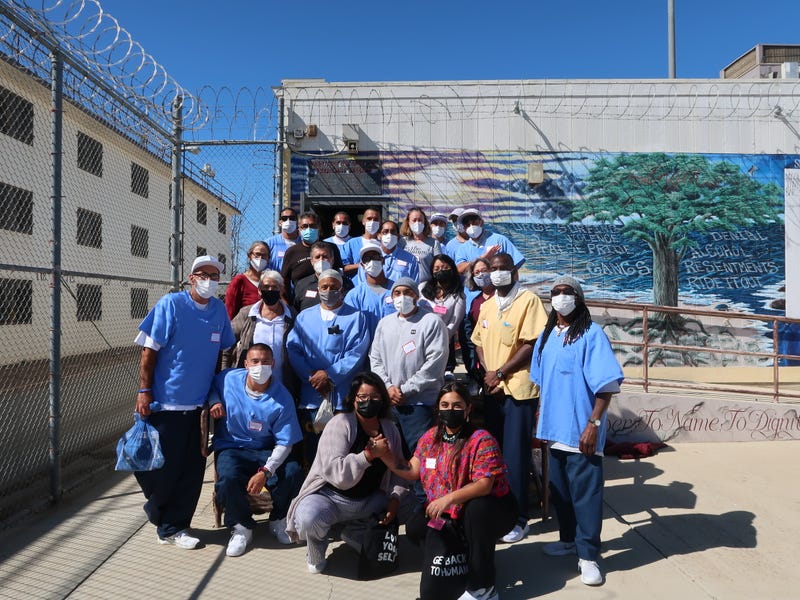
Editor's note: Crime in the Bay Area, and around California, has attracted national attention in recent months.
San Francisco's recall of former District Attorney Chesa Boudin shined a spotlight on the debate about how to increase community safety, prevent criminals from reoffending and protect victims.
In this series of special reports, KCBS Radio will examine the innovative approach of an East Bay nonprofit called the Ahimsa Collective.
In Part 3, we see what some of the incarcerated men have written in the apology letters to the people they have harmed.
Warning: References to violence in these stories might be upsetting to some readers.
For more, stream KCBS Radio now.
SOLEDAD, Calif. – The Ahimsa Collective's Empathize Program works to help people who have committed violent crimes understand the impacts of their actions, and men incarcerated at Soledad State Prison write letters to the people they've harmed as part of it.
One of the men's drafts began:
To the daughter of John Doe,
These words are written to you because of the pain inside your heart for my actions that led to the cold blooded murder of your loving father …
Your father did nothing either by his words or actions to deserve the violence which was inflicted upon him. For being responsible for the death of your father, I am deeply sorry.
The survivors of crime we met earlier in this series often come into the prison to share their stories, and also to help the incarcerated men write their apology letters.
To illustrate how receiving an apology might impact a survivor, Elle O'Dowd shared the story of her experience after her daughter, Emily, was killed by a drunk driver.
She explained that she was still trying to process her daughter's death when she got a letter through the district attorney's office.
At the time, Elle was not ready to hear about the life that the man who killed Emily was living in prison.
"He was telling me that he was taking college courses," she told the group inside the prison. "And I was like, 'What do you mean you’re taking college courses?' Emmie was finally getting to the point where she was thinking about going back to school."
Martina Lutz Schneider, a program manager with the Ahimsa Collective, explained how all of those details help to humanize the impacts of crime.
"There is nothing more impactful for a person who has caused harm (than) to sit across a crying mother who has lost her loved one," she told KCBS Radio. "When you are in the courtroom as the accused, and you hear you have violated Penal Code 657 and that’s why you're going to prison, it doesn't have much meaning."
Speaking to the survivors who had come into the prison, one incarcerated man talked about the impact their visits had on him.
"I've been down about 15 years, and I’ve got to tell you, the most intimidating thing I’ve ever seen was seeing you guys walk up on the yard," he said. "That was scary. It's like a day of reckoning. It's like a day of being accountable. And I really appreciate you guys doing that."
When the men enrolled in Empathize write their apology letters, they apply what they have learned from the survivors and try to empathize with a victim.
Part of another letter shared inside Soledad State Prison read:
I am responsible and deeply regret everything.
I can only imagine what you were thinking when I was attacking you: Why is he doing this? Is he going to kill me? Will he not stop? Am I going to see my family again?
They are the kind of thoughts that might have been going through Jane Piper's mind when she was attacked one day after a trip to the grocery store.
"And it helps me because I don't have an apology letter from the man who raped me," she told KCBS Radio. "I would love to get one."
Asked what she would like that letter to say, she thought about it for a moment.
"I would like it to say, 'I remember that I did this, and I'm really sorry,' " she said. "I would like to hear that he is sorry and that is changing his life and that he is working to help others now."
Piper deliberately uses the word "rape" when she talks about what happened to her because she personally feels that it is important to be direct.
In her workshop, she advised the incarcerated men to acknowledge what they did and take responsibility.
Part of another man's draft apology letter read:
On Sept. 4 of 2011 I broke into your home to rob and kill you. I broke your elbow. I caused you to get cuts on your feet from broken glass. I punched you and kicked you in the face and body. I choked you, I tased you, I gagged you. I made you live in fear. I did all that and more to you because I was a sad and broken coward who could not take any real accountability in his life.
Lutz Schneider said that addressing that feeling of being sad and broken is also key to stopping these men from harming others in the future.
"To me, this comes back to community safety," She said. "People who hate themselves will hate themselves and hurt others."
In Part 4, we will learn why another survivor of violent crime feels uncomfortable about the approach of the Empathize Program.
Special Reports from Soledad State Prison
PART 1 | PART 2 | PART 3 | PART 4 | PART 5
DOWNLOAD the Audacy App
SIGN UP and follow KCBS Radio
Facebook | Twitter | Instagram

